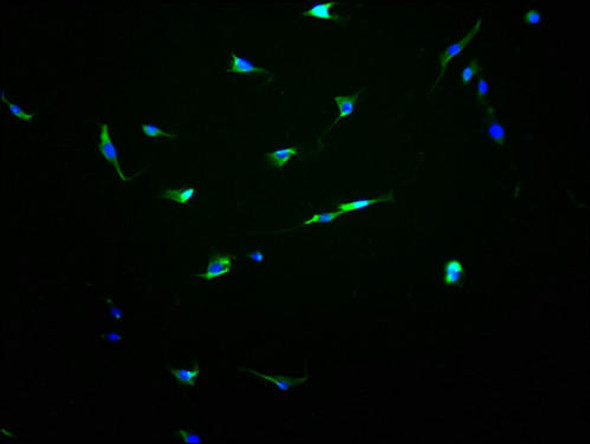Description
| Antibody Name: | PSMC3IP Antibody (PACO11542) |
| Antibody SKU: | PACO11542 |
| Size: | 50ul |
| Host Species: | Rabbit |
| Tested Applications: | ELISA, WB, IHC |
| Recommended Dilutions: | |
| Species Reactivity: | Human, Mouse, Rat |
| Immunogen: | Human PSMC3IP |
| Form: | Liquid |
| Storage Buffer: | PBS with 0.1% Sodium Azide, 50% Glycerol, pH 7.3. -20°C, Avoid freeze / thaw cycles. |
| Purification Method: | Antigen Affinity Purified |
| Clonality: | Polyclonal |
| Isotype: | IgG |
| Conjugate: | Non-conjugated |
| Synonyms: | PSMC3 interacting protein;PSMC3IP;GT198;HOP2;HUMGT198A;TBPIP ; |
| UniProt Protein Function: | PSMC3IP: Plays an important role in meiotic recombination. Stimulates DMC1-mediated strand exchange required for pairing homologous chromosomes during meiosis. The complex PSMC3IP/MND1 binds DNA, stimulates the recombinase activity of DMC1 as well as DMC1 D-loop formation from double-strand DNA. This complex stabilizes presynaptic RAD51 and DMC1 filaments formed on single strand DNA to capture double-strand DNA. This complex stimulates both synaptic and presynaptic critical steps in RAD51 and DMC1- promoted homologous pairing. May inhibit HIV-1 viral protein TAT activity and modulate the activity of proteasomes through association with PSMC3. Acts as a tissue specific coactivator of hormone-dependent transcription mediated by nuclear receptors. Defects in PSMC3IP are the cause of ovarian dysgenesis type 3 (ODG3). A disorder characterized by lack of spontaneous pubertal development, primary amenorrhea, uterine hypoplasia, and hypergonadotropic hypogonadism as a result of streak gonads. Belongs to the HOP2 family. 2 isoforms of the human protein are produced by alternative splicing.Protein type: Nuclear receptor co-regulatorChromosomal Location of Human Ortholog: 17q21.2Cellular Component: nucleusMolecular Function: DNA binding; ligand-dependent nuclear receptor transcription coactivator activityBiological Process: meiotic cell cycle; DNA recombinationDisease: Ovarian Dysgenesis 3 |
| UniProt Protein Details: | |
| NCBI Summary: | This gene encodes a protein that functions in meiotic recombination. It is a subunit of the PSMC3IP/MND1 complex, which interacts with PSMC3/TBP1 to stimulate DMC1- and RAD51-mediated strand exchange during meiosis. The protein encoded by this gene can also co-activate ligand-driven transcription mediated by estrogen, androgen, glucocorticoid, progesterone, and thyroid nuclear receptors. Mutations in this gene cause XX female gonadal dysgenesis. Alternative splicing of this gene results in multiple transcript variants. [provided by RefSeq, Dec 2011] |
| UniProt Code: | Q9P2W1 |
| NCBI GenInfo Identifier: | 7706577 |
| NCBI Gene ID: | 29893 |
| NCBI Accession: | NP_057640 |
| UniProt Secondary Accession: | Q9P2W1,Q14458, Q8WXG2, Q96HA2, C5ILB7 |
| UniProt Related Accession: | Q9P2W1 |
| Molecular Weight: | 11,070 Da |
| NCBI Full Name: | homologous-pairing protein 2 homolog isoform 2 |
| NCBI Synonym Full Names: | PSMC3 interacting protein |
| NCBI Official Symbol: | PSMC3IP |
| NCBI Official Synonym Symbols: | HOP2; ODG3; GT198; TBPIP; HUMGT198A |
| NCBI Protein Information: | homologous-pairing protein 2 homolog |
| UniProt Protein Name: | Homologous-pairing protein 2 homolog |
| UniProt Synonym Protein Names: | Nuclear receptor coactivator GT198; PSMC3-interacting protein; Proteasome 26S ATPase subunit 3-interacting protein; Tat-binding protein 1-interacting protein; TBP-1-interacting protein |
| Protein Family: | Homologous-pairing protein |
| UniProt Gene Name: | PSMC3IP |
| UniProt Entry Name: | HOP2_HUMAN |






